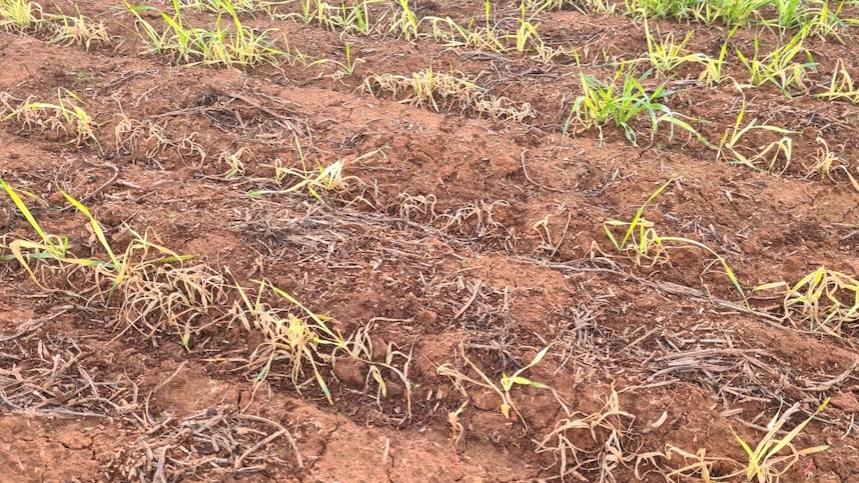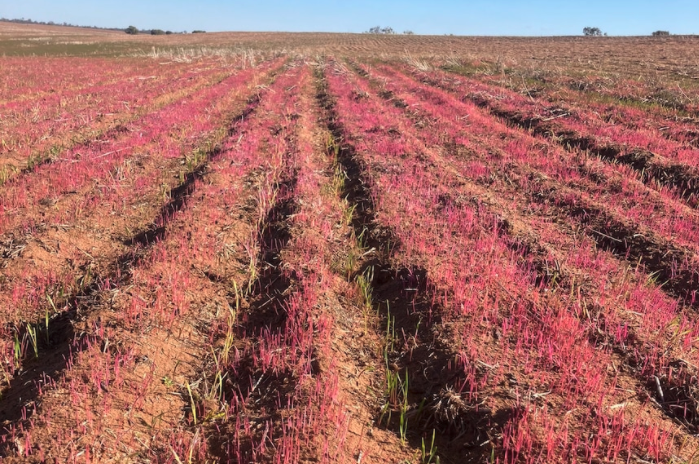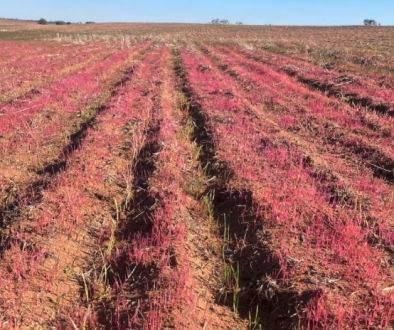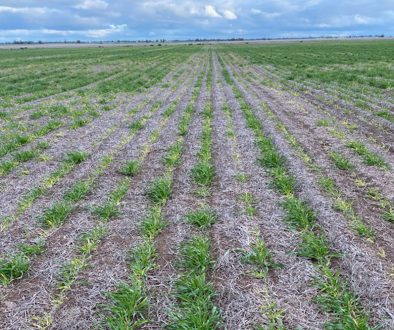
This dying cereal crop in western Victoria is an extreme example of Overwatch damage.
Legal battle looms over Overwatch herbicide some farmers say has damaged their crops
Debate over a new farm chemical appears headed for the law courts, with a Sydney law firm this week asking grain growers to join a class action against the herbicide’s manufacturer.
Key Points
- A class-action legal case is being mounted over a farm chemical
- The manufacturer says it wants to resolve the issue with growers
- It may offer compensation to affected growers
Overwatch is a pre-emergent herbicide developed by chemical company FMC, launched commercially this year to much fanfare, thanks to its ability to control ryegrass – one of the country’s worst weeds — in barley, wheat and canola.
But there have been mixed reactions in its first season of use.
Some farmers say it has been extremely effective in killing ryegrass and has not affected their crops, but others say it has caused bleaching that will lead to substantial yield penalties.
Class action proposed
Brett Imlay, a special counsel with law firm Levitt Robinson, which is bringing the class action against FMC, said the firm had been approached by a group of farmers from Victoria’s Wimmera region.
“They’ve had experiences across their barley and wheat crops with bleaching, which is not growing out,” he said.
“They’ve used Overwatch in some of their paddocks, and they have a very good comparator to see how their crops are going with and without Overwatch, and they’re forecasting a loss of yields in the order of 30 to 40 per cent.”

This dying cereal crop in western Victoria is an extreme example of Overwatch damage.
Mr Imlay said FMC had predicted the chemical would cause bleaching of crops in some cases but said there would be no yield penalty.
“All of the messages FMC put out were that this product had been thoroughly tested and was safe.” he said
“And yes, there would be some bleaching, but the crop would grow out, and it would not affect yield.
“That is not the experience. That is not what’s happening,” he said.
Mr Imlay said he had spoken to farmers and agronomists who described the damage as the worst they had seen in their careers.
“It’s far too early to talk about estimated damages, but on an individual basis — and these are not big growers — they say they’ve suffered $200,000, $250,000 in damage.
“That’s what they’re forecasting at this stage given what they’re seeing in their paddocks.”
FMC may pay compensation
Kristina Hermanson, managing director of FMC in Australia and New Zealand, said the company was inspecting affected crops.
“We’re really focused on investigating reports in the paddock on a case-by-case basis, and the reality is the incidence of really enhanced bleaching is still estimated at one per cent or less of the total crop area,” she said.

“It’s September, so no-one has actually suffered a measurable yield penalty until we get to harvest, but we’re aware of some of the cases.”
Ms Hermanson said if it was shown that growers followed the chemical’s label directions and their crops were still damaged, compensation would be offered.
“Class actions, I’ve been advised, can end up taking 50 per cent of any kind of settlement.
“They can also take up to three to four years. We’re looking to resolve things with growers that have legitimate cases in this season,” she said.

This dying cereal crop in western Victoria is an extreme example of Overwatch damage.
Legal battle looms over Overwatch herbicide some farmers say has damaged their crops
Debate over a new farm chemical appears headed for the law courts, with a Sydney law firm this week asking grain growers to join a class action against the herbicide’s manufacturer.
Key Points
- A class-action legal case is being mounted over a farm chemical
- The manufacturer says it wants to resolve the issue with growers
- It may offer compensation to affected growers
Overwatch is a pre-emergent herbicide developed by chemical company FMC, launched commercially this year to much fanfare, thanks to its ability to control ryegrass – one of the country’s worst weeds — in barley, wheat and canola.
But there have been mixed reactions in its first season of use.
Some farmers say it has been extremely effective in killing ryegrass and has not affected their crops, but others say it has caused bleaching that will lead to substantial yield penalties.
Class action proposed
Brett Imlay, a special counsel with law firm Levitt Robinson, which is bringing the class action against FMC, said the firm had been approached by a group of farmers from Victoria’s Wimmera region.
“They’ve had experiences across their barley and wheat crops with bleaching, which is not growing out,” he said.
“They’ve used Overwatch in some of their paddocks, and they have a very good comparator to see how their crops are going with and without Overwatch, and they’re forecasting a loss of yields in the order of 30 to 40 per cent.”

This dying cereal crop in western Victoria is an extreme example of Overwatch damage.
Mr Imlay said FMC had predicted the chemical would cause bleaching of crops in some cases but said there would be no yield penalty.
“All of the messages FMC put out were that this product had been thoroughly tested and was safe.” he said
“And yes, there would be some bleaching, but the crop would grow out, and it would not affect yield.
“That is not the experience. That is not what’s happening,” he said.
Mr Imlay said he had spoken to farmers and agronomists who described the damage as the worst they had seen in their careers.
“It’s far too early to talk about estimated damages, but on an individual basis — and these are not big growers — they say they’ve suffered $200,000, $250,000 in damage.
“That’s what they’re forecasting at this stage given what they’re seeing in their paddocks.”
FMC may pay compensation
Kristina Hermanson, managing director of FMC in Australia and New Zealand, said the company was inspecting affected crops.
“We’re really focused on investigating reports in the paddock on a case-by-case basis, and the reality is the incidence of really enhanced bleaching is still estimated at one per cent or less of the total crop area,” she said.

“It’s September, so no-one has actually suffered a measurable yield penalty until we get to harvest, but we’re aware of some of the cases.”
Ms Hermanson said if it was shown that growers followed the chemical’s label directions and their crops were still damaged, compensation would be offered.
“Class actions, I’ve been advised, can end up taking 50 per cent of any kind of settlement.
“They can also take up to three to four years. We’re looking to resolve things with growers that have legitimate cases in this season,” she said.


